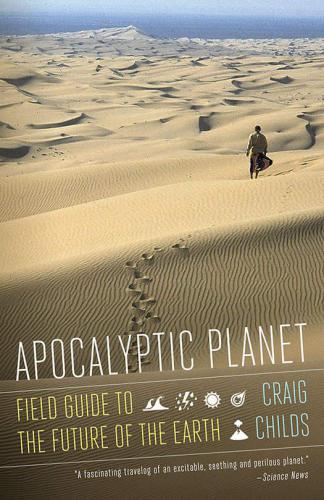
Apocalyptic Planet
Field Guide to the Future of the Earth
- اطلاعات
- نقد و بررسی
- دیدگاه کاربران
نقد و بررسی

Starred review from July 16, 2012
In an adventure tale, scientific overview, requiem, and celebration, Childs offers a mesmerizing and provocative look at our ever-changing, “everending” planet. We live on “an excitable planet,” one where mass extinctions—five previous and a sixth currently underway—happen in cycles we’re only beginning to understand. To deconstruct popular notions of impending apocalypse and what such an event might entail, Childs, an adventure journalist and science commentator, sweeps readers away to Earth’s most extreme environments: from Mexico’s Sonoran desert—where clustered bones of Pleistocene animals mark an ancient watering hole—to a frigid, treeless expanse on the west coast of Greenland. In northern Patagonia, he visits a great melting ice field, the “last of the Ice Age in retreat.” Hiking in Grundy County, Iowa, through steamy, humid fields ruthlessly cleansed of everything but dense rows of genetically modified corn, he notes how “biodiversity, one of the key indicators for environmental quality, has tanked in these agricultural regions.” Stunning descriptions underscore that, by all evidence, “This is what every mass extinction in earth’s history has looked like.” Childs’s lively writing reveals awesome, otherworldly landscapes—a rock-riddled, monsoon-swollen river in northeastern Tibet; the stark, searing lava fields around Hawaii’s Mauna Kea volcano—sharing his wonder at their existence as much as what they reveal about our planet’s future and past. Agent: Kathy Anderson, Anderson Literary Management.

August 15, 2012
The Earth has always been prone to violent changes, natural disasters, mass extinctions and climate extremes. Global warming will make matters worse, but this lyrical natural history is both a polemic and a preview. Science writer and NPR commentator Childs (Finders Keepers: A Tale of Archaeological Plunder and Obsession, 2010, etc.) aims to experience the apocalypse firsthand. Childs walked the ergs (wind-swept sand with no vegetation) of Mexico and the rainless plains of northern Chile. He visited the frigid Bering Sea, only 100 feet deep and once a vast, ice-free plain, listening to native Inuits complain of rising seas. Trekking the Andes, he observed rubble left by the retreat of the greatest nonpolar glaciers before visiting Greenland, where researchers are recording travails from a far more massive ice sheet. He turned up mass extinction in prosperous Iowa, formerly home to thousands of High Plains species, today a monoculture of genetically modified cornfields in soil that now consists mostly of high-yield petroleum products harboring a dozen other life forms barely surviving in the chemical soup. Civilizations collapse when infrastructure fails. Childs recounts the Hohokam, whose culture and complex irrigation infrastructure withered centuries before settlers arrived at his native Phoenix. American infrastructure (water delivery, sewers, bridges, dams) is crumbling; 240,000 U.S. water mains burst every year. Childs pauses regularly to allow scientists to explain what's happening and deliver gloomy forecasts, but he eschews the traditional how-to-fix-it conclusion. Gripping descriptions of deteriorating ecosystems that may soon require less travel and perhaps none at all for readers to experience.
COPYRIGHT(2012) Kirkus Reviews, ALL RIGHTS RESERVED.

September 15, 2012
Childs traveled the world to destinations both exceptional and mundane seeking clues to what life will be like in the future on our increasingly unstable planet. Ruminating on our distant past and present changes, he blends climate science, natural history, literary references, and personal reflections to create an immensely evocative sense of time and place. From Greenland's glaciers to a blistering hot Iowa cornfield (a place Childs characterizes as suffering from genetic exhaustion ), he immerses himself in parts of our world that scientists endlessly study but we willfully ignore. He consults great minds, cajoles friends into sharing his adventures (with often hilarious results), and brings his mother along in an attempt to gather clues and form conclusions about the end of the world as we know it. Surprisingly, this is not a work of darkest sorrow but rather an engaging exploration of the land beneath us and the sixth mass extinction that scientists agree is underway. Always curious, Childs went out in the world to learn in the presence of apocalypse, taking readers along for the intriguing ride.(Reprinted with permission of Booklist, copyright 2012, American Library Association.)




دیدگاه کاربران